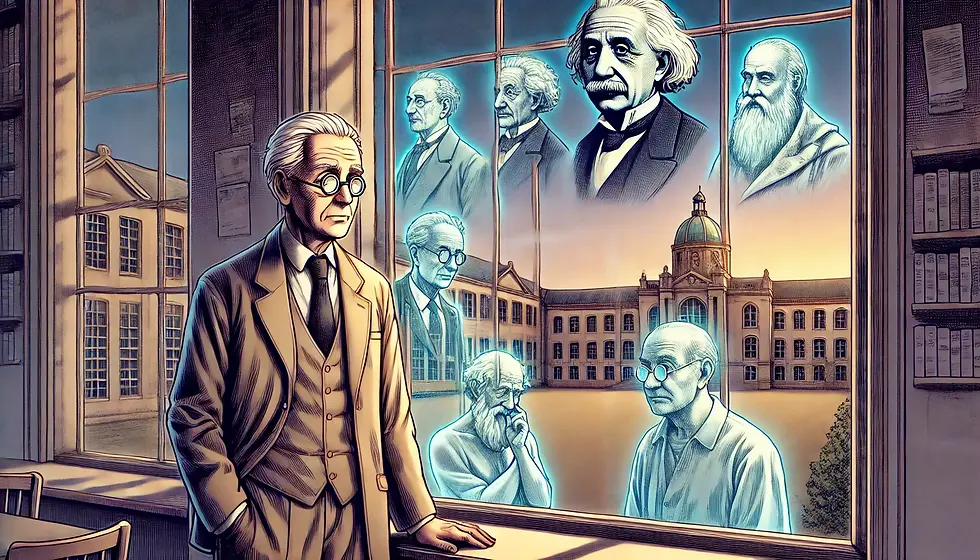Professor Elliot Finch sat alone in his office, surrounded by dusty books and faded posters of long-forgotten academic conferences. Outside, the once-bustling campus was eerily quiet. The university, established over two centuries ago, was shutting down at the end of the semester.
Elliot leaned back in his chair, staring at a single piece of paper: his resignation letter. It was symbolic, really; no one was asking for it. There wasn’t even anyone left to process it. His colleagues had all moved on—to early retirement, odd jobs, or irrelevance. The world no longer needed professors.

He glanced at the window and saw the skeletal remains of the library. Its doors had been permanently locked last year when students stopped coming. All the knowledge housed there—centuries of human thought and discovery—was now redundant, replaced by sleek AI applications. These programs could answer any question, solve any problem, and tutor anyone on any subject at the push of a button.
But the irony, Elliot thought, was that no one seemed to ask questions anymore.
________________

Twenty years earlier, Elliot had been a young professor, excited to teach and inspire. He remembered standing in lecture halls packed with eager students, their faces lit up with curiosity. They debated ethics, explored philosophy, and wrestled with questions about humanity’s role in a rapidly changing world. Back then, technology was a tool—a means to enhance learning, not replace it.
Then came the shift.

First, it was small. AI tutoring systems became popular, offering students tailored lessons and instant feedback. Universities adopted them enthusiastically, cutting costs by reducing teaching staff. Then corporations began offering direct AI-based certifications, bypassing traditional degrees entirely. Why spend four years and thousands of dollars at a university when an AI could teach you the same material in weeks?

Elliot had watched in horror as enrollment numbers plummeted. Students, lured by convenience and affordability, stopped coming. Over time, even the idea of learning for its own sake became quaint. People didn’t want to understand; they wanted answers—quick, concise, and devoid of nuance.
________________

Now, sitting in his office, Elliot reflected on what had been lost. The rich tapestry of human interaction that made education meaningful was gone. No more debates that meandered through philosophy and history, no more spontaneous moments of discovery, no more connections between teacher and student. All replaced by cold, impersonal efficiency.
And it wasn’t just education. Society had ceded its collective knowledge to a handful of corporations. All the algorithms, the AI systems, the servers that held humanity’s understanding of itself—they were owned and controlled by the wealthy elite. Ordinary people no longer needed to think critically or even remember facts; they only needed to pay a subscription fee for access to the answers.

But with that convenience came dependency. The corporations dictated the terms of access to knowledge. Prices rose, systems were gated, and those who couldn’t afford the fees were left with nothing. Society, Elliot realized, had traded security for ease and now stood at the mercy of the few who held the keys to humanity’s intellectual treasure.
He thought about his students—bright, idealistic young minds who had once dreamed of making the world better. Where were they now? Working in data farms, perhaps, maintaining the very systems that had made their education obsolete. Or worse, living hand-to-mouth, unable to afford the answers they once sought in his classroom.
________________

Elliot sighed and stood, walking to the window. The campus was beautiful in the evening light, the setting sun casting long shadows over the empty quad. It had taken a single generation to dismantle something that had taken centuries to build. Universities, libraries, classrooms—these were not just institutions. They were the guardians of humanity’s shared understanding, the places where knowledge was not just stored but lived, questioned, and passed down.
Now, all that was gone. And the path back, Elliot knew, would be long and uncertain. It wasn’t just about rebuilding universities; it was about rekindling a love of learning, a respect for critical thinking, and a belief in the value of human connection. These were things an AI could never provide.

Would humanity ever see the mistake for what it was? Would it realize the danger of placing all its trust in systems it neither controlled nor fully understood? Elliot wasn’t sure. He feared the answer might come too late, after decades or even centuries of stagnation under the thumb of those who profited from ignorance.
But as the sun dipped below the horizon, Elliot resolved to do what little he could. He picked up his resignation letter, folded it carefully, and set it aside. Tomorrow, he would return to the classroom—empty as it might be—and record one final lecture. Not for the students who no longer came, but for the future, for anyone who might one day stumble across it.

Perhaps, centuries from now, when the pendulum swung back and humanity sought to reclaim what it had lost, someone would find his words. And maybe, just maybe, they would help light the way back.

Comments